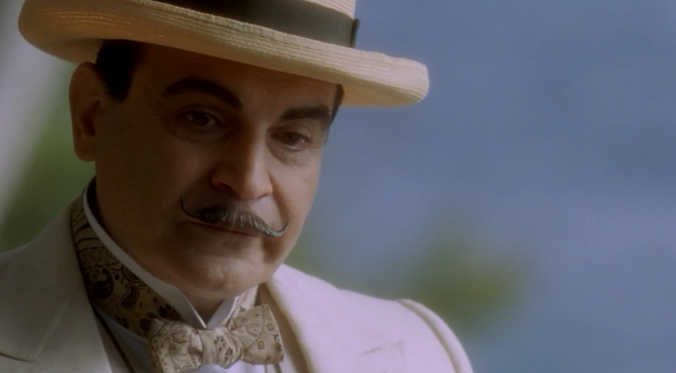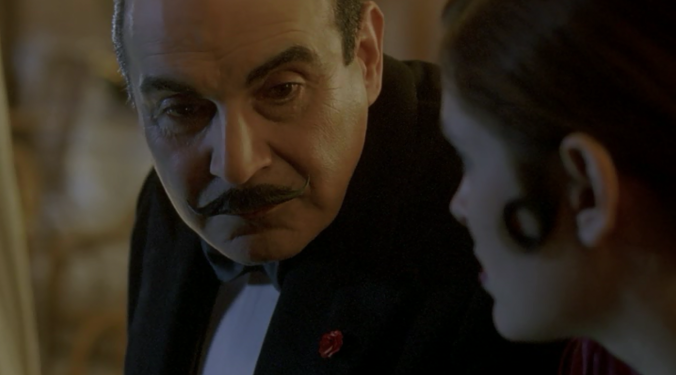One of the most touching aspects of Christie’s characterization of Poirot are those glimpses of loneliness inherent in a character who has missed out on the personal relationships that lead to marriage and family life. ***As always, spoilers for everything!***
*************
‘I, Madame, am not a husband,’ said Hercule Poirot. ‘Alas!’ he added.
‘I’m sure there’s no alas about it. I’m sure you’re quite delighted to be a carefree bachelor.’
‘No, no, Madame, it is terrible all that I have missed in life.’
-Dead Man’s Folly
**************
Viewers of the television series will notice that the theme develops and increases over time, especially in the filming of the novels. And yet, glimpses can be seen very early on in the series as well. Some are subtle, and others are blatantly obvious. There are nuances and shades of meaning in these fleeting and poignant moments, but they all share the same characteristic of wistful loss. Here I present 15 gloriously-rendered examples.
1) Third Floor Flat– Perhaps the first clear example in the series. It is unique, and pleasing for Christie readers, in that we get a glimpse of the nostalgic admiration of a girl who resembles an old flame of Poirot’s before the matter is explained to the viewer. So, readers who know the story are gratified to have “inside knowledge” of what lies behind the faraway smile, which will be explained in later scenes. ‘If I were your age, monsieur, without doubt, I too would be in love with her.’

2) The Plymouth Express– Another early example, this is the first clear indication we have that Poirot would very much have liked to have been a father and a husband. The expression says it all, in response to Halliday’s: ‘You’re not a father, Poirot. You don’t know what it’s like, trying to bring up a daughter all on your own… no wife to talk it over with…’ Also, it is perhaps the first time the viewer becomes annoyed with the lack of tact of those who remind Poirot what he’s missed out on!

3) The Double Clue– This one’s pretty obvious, of course, and it has the added novelty of a presently-kindled flame, with some returned affection, yet the impossibility of the relationship going anywhere. There are several other meditations on personal loss throughout the episode, from the loss of wealth to the loss of one’s homeland. But all the poignancy is concentrated in loss of a chance at love.

4) The Chocolate Box– It’s fascinating that this particular story was, when scripted, turned into another sort of dead-end romance, this time from Poirot’s past. I suppose it gives Virginie a little more “connection” to the plot than she seems to have in the original story, and since the incident is buried long in the past, one can get away with adding romantic elements. An added nuance to the sadness-tinged reunion with her is that Poirot has a glimpse of what life could perhaps have looked like for him, had les Boches not driven him from his native Belgium as a refugee: sons in native uniform, and a wife of his own country. ‘…I was just saying to Jean-Louis that he was always the most fortunate of men.’

5) Lord Edgware Dies– A rarity in that Poirot, Hastings, Japp, and Miss Lemon are all together at dinner when the conversation turns to Poirot’s lamented bachelorhood. It’s a subject that is clearly uncomfortable for Poirot, made weirder with the flattering attentions recently given him by Jane Wilkinson. Also, we have another indication (suggested as early as Third Floor Flat) that Poirot considers himself too old, and that the time of la tentation is lost in the past. ‘But now, alas, I think it is too late.’

6) The Mystery of the Blue Train– This is one of several examples of the awakening of loneliness and loss that comes, not from a romance of his own, but from some pretty young friend Poirot has met in the course of the case. In this instance, he has a travelling companion to whom he becomes an ‘avuncular.’ Like a daughter (in fact, she had lost her father and has a cry on his shoulder about it), Katherine Grey is a somewhat needy character who was taken under his wing. When she leaves him unexpectedly to go off on her own, he is struck again by the pain of solitude. The film ends when, after she leaves, he is left by the water’s edge, contemplating the happy, carefree family before him (consisting, incidentally, of an older woman, her much younger husband, and her grown daughter). This loss strikes me as resonating more with the parental sadness of the empty nest– although in Poirot’s case, his patronage came and went very quickly. I’m also reminded of one of Poirot’s iconic lines at the end of the book: ‘Life is like a train, Mademoiselle…’ And ultimately, he is fated to travel it alone. And we’re all sad.

7) Death on the Nile– A classic example, and one that works beautifully with the plot, which is seething with the desperation to which love might drive a person. ‘Love is not everything,’ Poirot says to Jacqueline. When she disagrees, he is forced to admit that he does not really understand this on a personal level, and is faced once again with the great loss of his life. At other times in his literary journey a la Christie, Poirot has expressed relief that he does not have an ‘ardent temperament’ because it has saved him from many embarrassments. But in this case the overwhelming devotion to a lover– an alien experience to Poirot– sparks pity in him, and he permits the couple to commit suicide rather than face the executioner. The precise reasons why– Poirot always has precise reasons– are spelled out a little more thoroughly in the book than in the adaptation.

8) After the Funeral– ‘The journey of life, it can be hard for those of us who travel alone, Mademoiselle.’ These are words, reminiscent of the theme in Blue Train, that Poirot states to the murderer– interestingly, very shortly after she has unknowingly incriminated herself with a fatal clue. In this context, the realization of loss and loneliness in life is displayed as a reality that transcends class, and the point of commonality Poirot finds here gives him an insight into the killer’s motive. To find another example of Poirot’s sympathy towards a woman who works as a lower-class companion and is driven to crime in a desperate bid for money, see “The Nemean Lion” from The Labours of Hercules.

9) Taken at the Flood– In this story, Poirot finds himself as a sort of godfather-type figure to Lynn Marchmont, whose father was a good friend. And, Lynn happens to fall in love with a mass murderer (!) This causes an awkwardness similar to Death in the Clouds and Three Act Tragedy– “Er, I’ve kinda just sent the guy you love to the gallows… sorry/not sorry?” But I include this example here because Lynn, of whom Poirot is ‘most fond’ and who had been planning on staying in England permanently, decides to leave again. ‘Write me a letter, Monsieur. I like your letters.’ It is a familial sort of loss for Poirot, and one full of turmoil in light of the bizarre circumstances of her departure.

10) Cat Among the Pigeons– This is one of the most curious and enigmatic moments of “wist” in the series. It is very fleeting moment in which Poirot, in the course of observing the various teachers at Meadowbank School, is watching a ballet lesson. A row of girls are at the barre and are practicing positions in pointe shoes. Poirot watches them with the most startling expression of bittersweet nostalgia on his face. Of what exactly is he thinking? The touching innocence of youth, uncorrupted by matters of crime? The disappointing fact that he himself was not to be the father of a daughter? Someone please ask David Suchet… he’s the only one who can read Poirot’s mind…

11) Third Girl– Another case (and a particularly disturbing one) in which the young couple in love awakens in Poirot his own sense of loss. This is one of the most emotional reactions Poirot has in the series; even Mrs. Oliver comments on his tears. ‘…The mystery that even I, Hercule Poirot, will never be able to solve… the nature of love…’

12) The Big Four– Almost everything in the final series touches on this theme. There’s a really interesting moment in this script when the housekeeper describes the fastidious and irritating habits of the deceased man (a bachelor), and Poirot appears to have a moment of sober enlightenment concerning his own bachelorhood. It’s very subtle and lends a moment of personal poignancy to the scene where the viewer wasn’t expecting one. Japp: “Did he ever marry?” Housekeeper: “Oh, no! Can you imagine it? What woman would have him? Woe betide you if you tried to move one of his precious books, or tidy up his bloomin’ letters!”

13) Elephants Can Remember– Poirot says to Zelie: ‘Mademoiselle, neither you nor I are married. We may never be married. But they should be.’ It’s the argument that finally persuades the chief witness to come forward with her story.

14) The Labours of Hercules– The scriptwriters were going really, really heavy on the “wist” here. The first example of the theme is Poirot’s visit to his doctor. ‘You’ve had a remarkable career– at the expense of having a family! Nothing wrong with that, but that’s what you’ve chosen…’ This is adding insult to the injury of having “failed” as a detective, and these two horrible realities dovetail to serve as the impetus to reunite Poirot’s chauffeur Ted with his lost love. This successful reunion contrasts with the totally tanked relationship with Vera Rossakoff, another grievous “what might have been” in the realm of personal relationships. There’s also an unprecedented use of fake wistfulness, when the Countess speculates what’s going through Poirot’s mind when he sees Alice, her daughter. ‘He looks at you… and he sees the life he might have had.’ We learn later that this isn’t actually what Poirot is thinking– he’s too busy having his suspicions alerted by the girl’s biting of her thumb!

15) Curtain– Was television ever as moving as this? Throughout his life, Poirot had never really brooded excessively on his regrets concerning love and family– rather, we see him repressing the pain and struggling past it. We don’t see this brooding in the final days of his life, either, as he focuses his attention on this most difficult of his cases. If anything, Hastings becomes the torch-bearer on the pain of loss in this episode– his wife, his daughter (to Franklin and Africa), and Poirot himself. In such a context, this line of Poirot’s, one of Christie’s own, is a most meaningful one: ‘My heart bleeds for you… my poor, lonely Hastings.’ Poirot knows, on every count, that Hastings is about to be left very much alone in the world. A lifetime of domestic loneliness endows him with sympathy for his friend’s losses, the blessings of which he had himself never enjoyed in the first place. Hastings finds himself choked up at this sentiment of Poirot’s, possibly because in spite of the fact that the man is near death and has struggled with loneliness for so many years– he will even die alone– it is Hastings’ loneliness, not his own, that most concerns him in those final moments.























